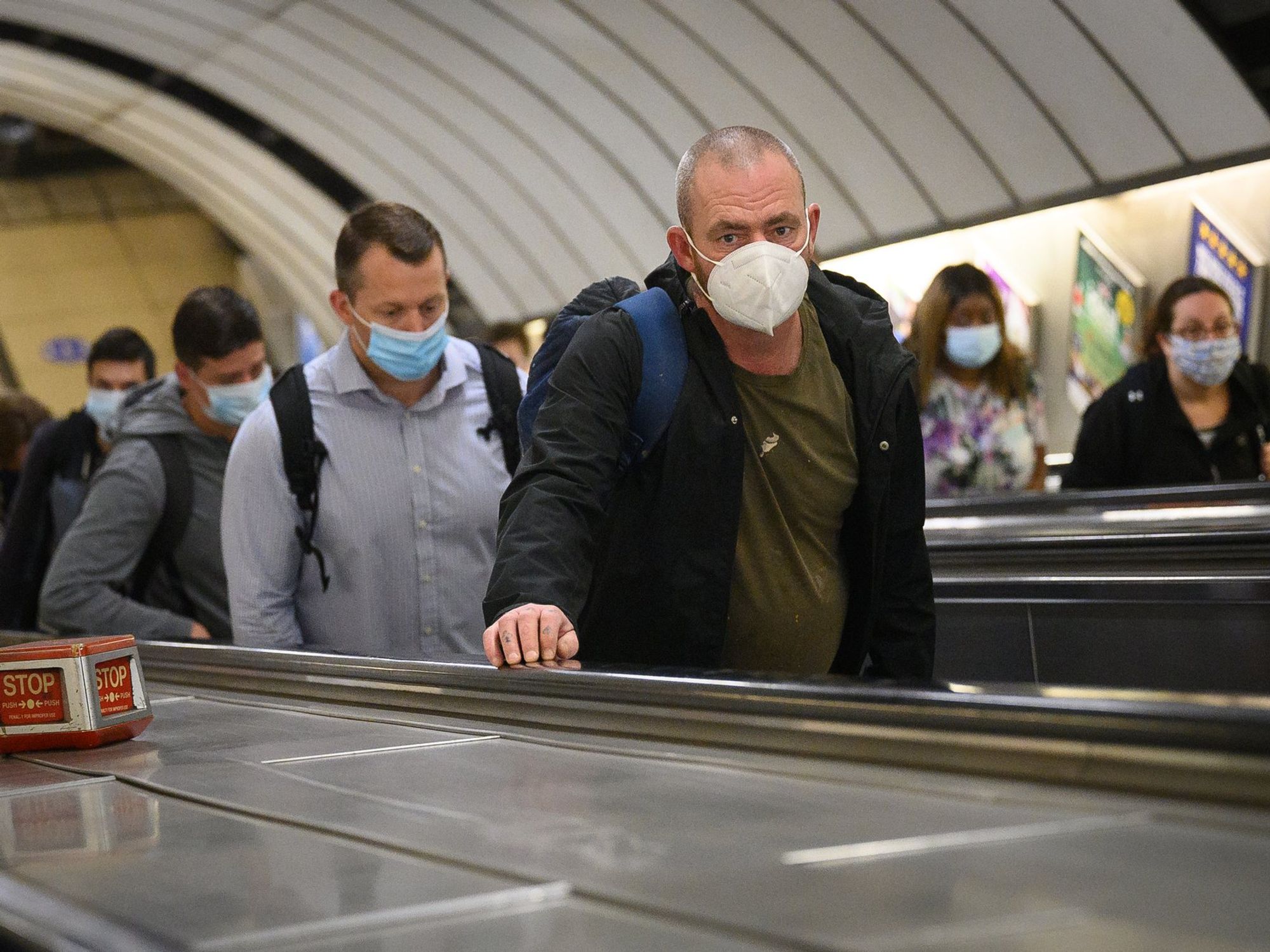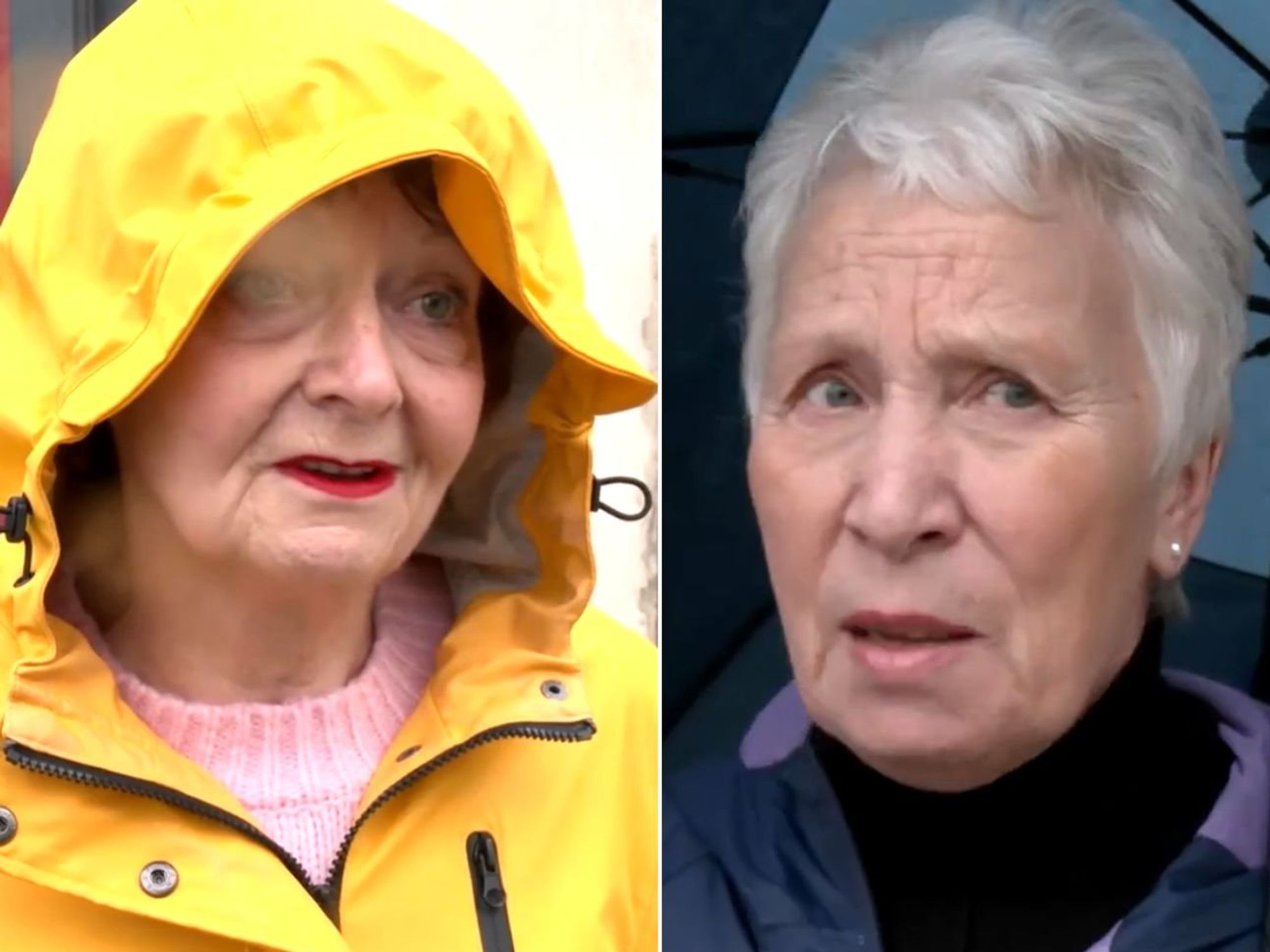GBN Health Check: Why are so many young people getting cancer? Oncologists deliver their verdict
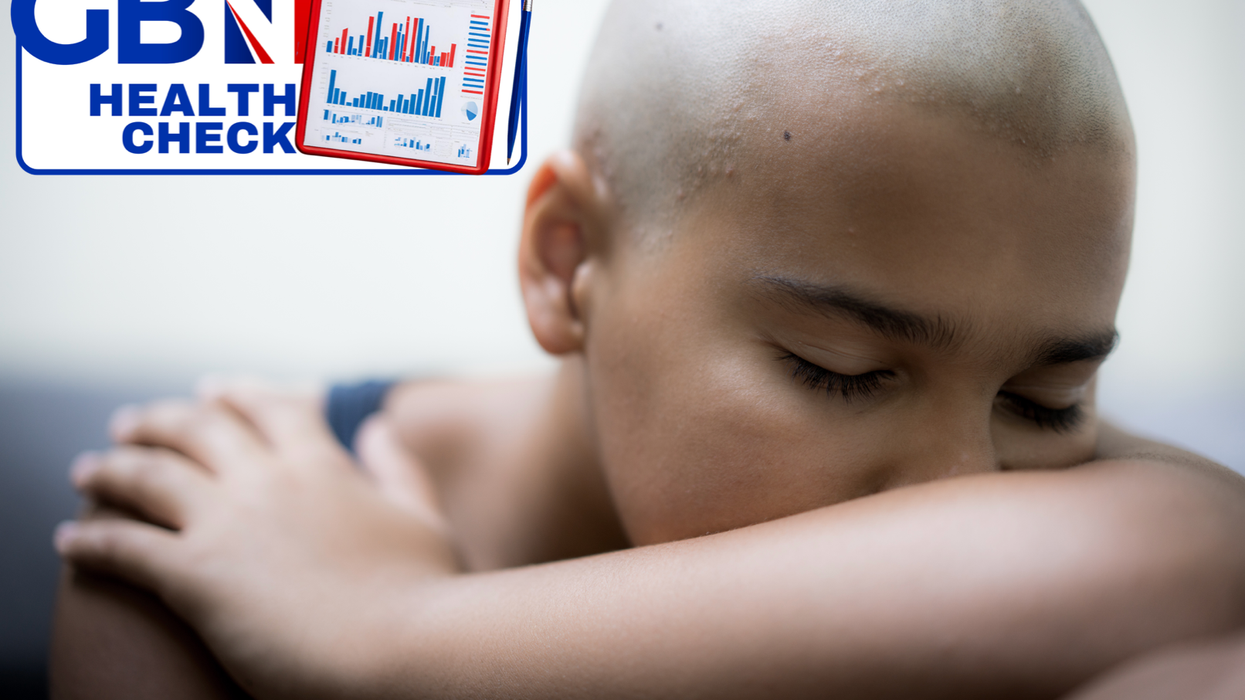
Rates of cancer are rising in younger people at an alarming rate
|Getty Images/GB News

A combination of factors are driving up rates of cancer in the young - but one stands out, oncologists tell our digital health editor
Don't Miss
Most Read
Amrik had just turned 18 when he got the news.
"All of a sudden I was being rushed from hospital room to hospital room. I had quite a lot of anger. And I was in disbelief as well. I couldn’t quite come to terms with the fact that I was faced with six months of chemotherapy," he said.
Anger and disbelief are normal responses to being told you have cancer.
Experiencing these emotions in the first flush of youth is a different matter altogether.
Nothing bursts the bubble of innocence quite like endless rounds of chemo and staring death in the face.
Patients tend to agree. A study of 97 survivors of childhood cancer found the majority felt they grew up faster than their peers, and over half felt more mature.
More youngsters than ever before are being enrolled in this school of hard knocks.
Approximately 100 younger adults in the UK were diagnosed with cancer every day between 2017 and 2019.
The increase in the number of cancer cases in this age group is still relatively small - around nine in 10 cancer cases still happen in people over 50 - but early-onset cancers are a growing cause for concern.
It is partially explained by population growth and improvements in diagnosis. Still, the percentage change is more than twice the 10 percent rise in over-75s - the group most at risk of the disease.
“Over recent decades, there has been a clear increase in cancer incidence rates in young adults in the UK,” said Cancer Research UK clinician Professor Charles Swanton. “Evidence suggests that more adults under 50 may be getting cancer than ever before.”
Almost 35,000 people aged between 25 and 49 were diagnosed with cancer in 2019. Incidence rates in this age group grew from 132.9 per 100,000 people in 1995 to 164.6 in 2019.
The second biggest jump in cancer rates were seen among the under-25s, where the rate of cancer increased by 16 percent, from 16.6 cases per 100,000 in 1995 to 19.2 cases.
The number of new cases in over-75s, meanwhile, grew from 2,259.7 per 100,000 people to 2,482.7 per 100,000 over the same period.
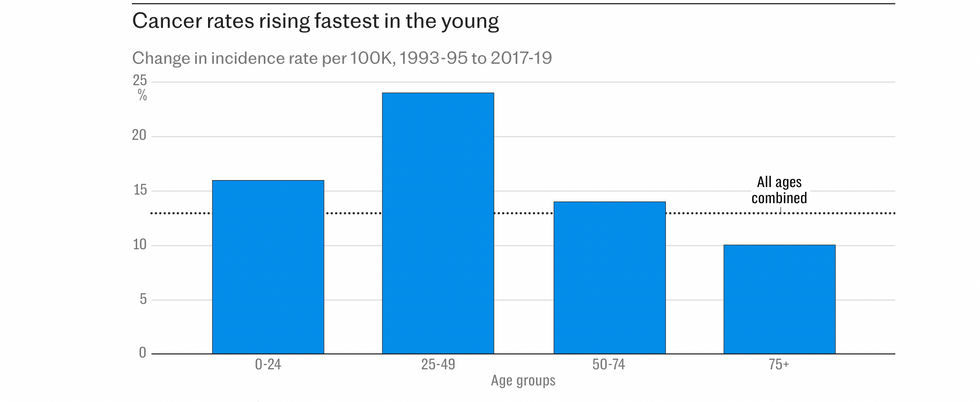
Approximately 100 younger adults in the UK were diagnosed with cancer every day between 2017 and 2019
|Cancer Research UK
A similar trend is happening across the pond.
Early-onset cancer, which is considered between ages 18 and 49, is on the rise in the US for cancer of the uterus, colon and rectum, as well as cancer of the pancreas, stomach, kidney and renal pelvis and cervix.
This is something Misagh Karimi, a medical oncologist at City of Hope Orange County in Irvine, California, is seeing in his clinic.
Research conducted by his practice shows that Orange County has the highest overall rate of cancer incidence in people under 50 in the state, compared to Los Angeles, Riverside, San Diego and San Bernardino counties.
A separate US-based study also found the generation immediately preceding Millennials is being diagnosed with cancer more often than their parents or their grandparents.
The new study — conducted by biostatisticians at the National Cancer Institute’s Division of Cancer Epidemiology and Genetics - used data on 3.8 million individuals with invasive cancer from the NCI Surveillance, Epidemiology, and End Results (SEER) Program from 1992-2018.
Researchers found that members of Generation X (aged between 44 – 59) may experience larger per-capita increases in the incidence of leading cancers combined than any prior generation born between 1908 and 1964.
This conclusion is based on the researcher's forecasts for Generation X’s cancer rates when they get to age 60 years.
Doctor Philip Rosenberg, who led the study, told GB News: "We expect this will happen because it appears – from our models - that gaining cancers will numerically overtake falling cancers in all demographic groups except Asian or Pacific Islander men."
The senior investigator in the Biostatistics Branch continued: "But we were most surprised by the number of cancer types that are projected to occur at higher rates in Generation X compared to Baby Boomers. Among females: colon, rectum, thyroid, kidney, uterus, ovary, pancreas, NHL and leukemia. Among males: colon, rectum, thyroid, kidney, prostate and leukemia."
This global surge in new early onset cancers and associated deaths is also projected to increase by 31 percent and 21 percent respectively, in 2030, with those in their 40s the most at risk, research suggests.
Why this matters
Cancer is among the leading causes of death worldwide, accounting for nearly 10 million deaths in 2020, or nearly one in six deaths. What you don't see in these numbers is the families torn apart by grief.
Its impact on an already-beleaguered healthcare system is no less devastating.
Frontier Economics, a consultancy, puts the cost of new preventable cancer cases diagnosed in the UK between 2023 and 2040 at £1.26 trillion.
The rise of cancers in younger generations compounds these challenges.
It also has downstream effects. Swedish researchers surveyed all people under the age of 25 who have had cancer since 1958.
The new study, led by researchers at Linköping University and Region Östergötland, shows that cancer survivors are at greater risk for cardiovascular diseases, other cancers and other diagnoses later in life.
The time to act is now
While it is important to understand what's driving this trend, changing the narrative around young people and cancer will have more of an immediate impact, Karimi at City of Hope claims.
As the oncologist sees it, the reality is that people with cancer are getting younger.
Refusing to acknowledge that fact is having a corrosive effect, with many young patients left to advocate for themselves, he laments.
This leads to diagnostic delays, which subsequently complicates treatment if the cancer has grown large or has spread by the time it's found, the oncologist adds.
A shift in attitudes is therefore needed while we deepen our understanding of what's going on.
...what is going on?
It is likely due to a combination of factors but obesity is thought to be the main driver.
“Changes to lifestyles and diets over time, and rising obesity, may all contribute to the uptick in early-onset cancer,” according to Professor Swanton of Cancer Research UK.
The pandemic accelerated these long-run trends. Obesity rose by 45 percent in reception pupils between 2019/20 and 2020/21, an analysis from over a million children in England shows.
In a recent discussion the rise of cancer in young people at the American Society of Clinical Oncology (ASCO) conference, scientists said unhealthy diets, a lack of exercise and obesity were likely to be factors behind the trend.
LATEST DEVELOPMENTS
Likewise, Donald Karcher, President at College of American Pathologists (CAP), points the finger at an increasingly sedentary lifestyle and easy access to ultra-processed foods as the main culprits.
A high-fat, low-fibre diet is known to be associated with cancer development, he tells GB News, citing recent studies that show a diet rich in ultra-processed foods (UPFs), such as fried snacks, processed meats, is associated with a significant increase in several cancers, including colon, breast, and pancreatic cancer.
This matters because adolescents account for some of the highest rates of UPF consumption, with studies estimating the percentage of their total energy intake obtained from UPF consumption being between 29 percent and 68 percent.
In a recent BMJ study, researchers looked at 45 studies on UPF exposure and health outcomes.
When analysed together, these studies suggested there was an increased risk of cancer.
It must be acknowledged that the increase was relatively small and most of the studies only offered very low-quality evidence for their claims. So currently, the evidence that UPFs directly cause cancer is still very weak.
This means big statements about ultra-processed foods and cancer cannot be backed up.
However, just because direct links cannot proven, that doesn’t mean there isn't an indirect link.
Ultra-processed foods are often high in salt, sugar and saturated fats. Eating too much of those ingredients can lead to weight gain.
And we know that being overweight and obese increases the risk of 13 different types of cancer.

Ultra-processed foods are often high in salt, sugar and saturated fats, all of which can lead to weight gain
|Getty Images
Dr. Nelly Awkar-Lazo, an oncologist based in Orange County, California, is inclined to agree that dietary risk factors, including excessive consumption of red meat, as well as excessive alcohol and tobacco consumption, may play a hand.
Doctor Awkar-Lazo draws attention to another interesting piece of the puzzle: accelerated ageing.
Emerging research aims to link accelerated aging - where biological age surpasses chronologic age - to early onset cancer.
Acelerated aging was more common in recent birth cohorts and was associated with increased incidence of early-onset solid tumuors, according to research presented at the American Association for Cancer Research (AACR) Annual Meeting 2024, held in April.
Ruiyi Tian, MPH, a graduate student in the lab of Yin Cao, ScD, MPH at Washington University School of Medicine in St. Louis and colleagues hypothesised that increased biological age, indicative of accelerated ageing, may contribute to the development of early-onset cancers.
In contrast to chronological age—which measures how long a person has been alive—biological age refers to the condition of a person’s body and physiological processes and is considered modifiable, Tian explained.
“Unlike chronological age, biological age may be influenced by factors such as diet, physical activity, mental health, and environmental stressors,” she added.
“Accumulating evidence suggests that the younger generations may be ageing more swiftly than anticipated, likely due to earlier exposure to various risk factors and environmental insults. However, the impact of accelerated aging on early-onset cancer development remains unclear.”
To examine the association between biological age and cancer risk in younger individuals, Tian and colleagues examined data of 148,724 individuals housed in the U.K. Biobank database. They calculated each participant’s biological age using nine biomarkers found in blood: albumin, alkaline phosphatase, creatinine, C-reactive protein, glucose, mean corpuscular volume, red cell distribution width, white blood cell count, and lymphocyte proportion.
Individuals whose biological age was higher than their chronological age were defined as having accelerated ageing.
Tian and colleagues first evaluated accelerated aging across birth cohorts and found that individuals born in or after 1965 had a 17 percent higher likelihood of accelerated ageing than those born between 1950 and 1954. They then evaluated the association between accelerated aging and the risk of early-onset cancers.
They found that each standard deviation increase in accelerated aging was associated with a 42 percent increased risk of early-onset lung cancer, a 22 percent increased risk of early-onset gastrointestinal cancer, and a 36 percent increased risk of early-onset uterine cancer.
Accelerated ageing did not significantly impact the risk of late-onset lung cancer (defined here as cancer diagnosed after age 55), but it was associated with a 16 percent and 23 percent increased risk of late-onset gastrointestinal and uterine cancers, respectively.
“By examining the relationship between accelerating ageing and the risk of early-onset cancers, we provide a fresh perspective on the shared etiology of early-onset cancers,” Tian noted.
“If validated, our findings suggest that interventions to slow biological aging could be a new avenue for cancer prevention, and screening efforts tailored to younger individuals with signs of accelerated ageing could help detect cancers early.”
Genetics may also be having an impact. All cancers are caused by genetic abnormalities that either exist in cells at birth (called germline abnormalities) or develop in cells over time (called acquired or somatic abnormalities).
"The germline genetic makeup of young people isn’t changing, but acquired genetic abnormalities that lead to cancer are happening earlier in young people, likely as a result of the combination of factors listed above," Karcher, the haemotologist, told GB News.
A germline variant is a change, or mutation, in a gene that is inherited from your parents and is in all your DNA.
There is some research to support his claims. People age 18 to 39 who are diagnosed with cancers typically seen in older adults, such as breast and prostate cancer, have a higher-than-expected risk of having a genetic mutation linked to cancer and might therefore benefit from genetic testing, concluded a 2020 study.
Close to 30 percent of early-onset colorectal cancers are attributable to high-risk genetic variants, such as those found in Lynch syndrome, a cluster of cancers including colorectal that are driven by inherited mutations.
“High-risk genes are rare but they have strong effects,” said Peters, holder of the Fred Hutch 40th Anniversary Endowed Chair, a nonprofit that focuses on innovative research and compassionate care to prevent and eliminate cancer and infectious disease.
“If you have these mutations in one of the DNA mismatch repair genes, the chances of getting colorectal cancer and other cancers are much higher.”
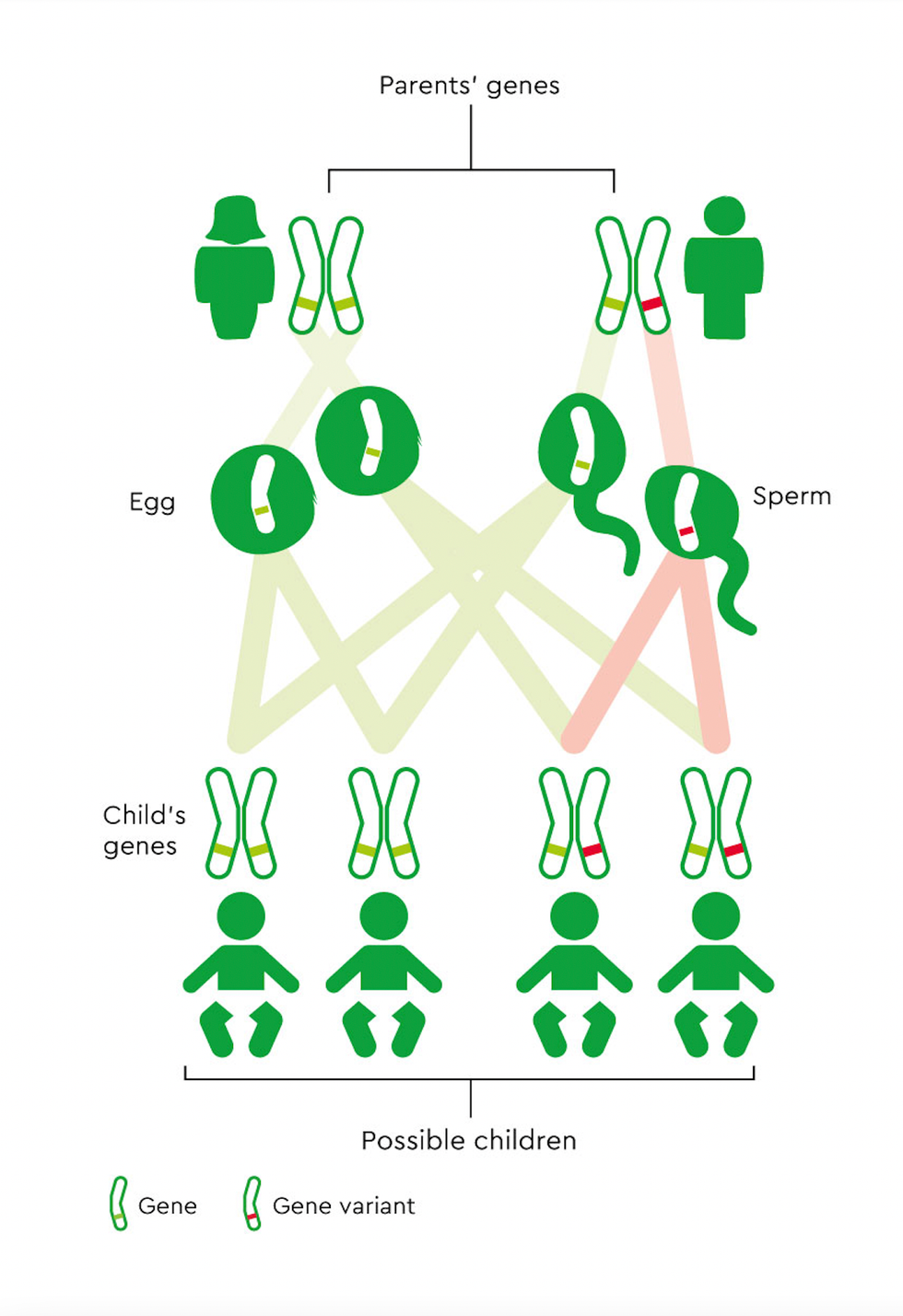
Cancers can be caused by genetic abnormalities that exist in cells at birth (called germline abnormalities)
|Macmillan Cancer Support
But high-risk genes don’t explain the steady rise in early colon cancers among the young, he says.
“We knew there must be environmental and lifestyle factors that explain the increase, Peters said. “A change in the last 20 to 50 years is not genetic.”
A study he recently co-led, published in the Annals of Oncology, found unique genetic risk factors, but they did not explain the rise of colorectal cases in people under 50.
However, these genetics led them to what they believe are the main drivers of this trend: alcohol consumption and obesity.
“We’ve seen substantial changes in our lifestyles and diets, as well as increasing obesity rates in higher income countries,” said Murphy, co-investigator on the study.
By comparing the genetic variations of healthy individuals with the genetic variations in those with colorectal cancer, they were able to precisely pinpoint which lifestyle factors were increasing the risk.
The researchers pulled out nearly 6,200 cases of early-onset colorectal cancer and nearly 66,000 healthy “controls.” Then they conducted a genome-wide association meta-analysis.
They then used that genome-wide association study, or GWAS, data to perform a Mendelian randomisation, which allowed them to look at causal associations between 28 risk factors and early-onset colorectal cancer.
Mendelian randomisation uses genetic variants as proxies for risk factors to allow causal inference between an exposure and outcome.
“It’s a trick we can use to find genetic risk factors linked to different traits and diseases,” Peters said.
"There are hundreds of genetic variants that increase risk of obesity. If a person has a lot of these genetic risk factors, they tend to have a higher risk of obesity. If those individuals also have a higher risk of colorectal cancer, we can infer that obesity is linked to colorectal cancer.”
Environmental factors may also be a contributing factor.
A new study led by the University of Minnesota’s Masonic Cancer Center and the U of M Medical School, researchers found that exposure to air pollution and vegetation may impact childhood cancer development. The study was published in the Journal of the National Cancer Institute.
The study found that from 1995-2011 increasing exposure to fine particulate matter (PM2.5) during the birth year increased the risk of developing any childhood cancer and specifically lymphoid leukemia, lymphoma, ependymoma, retinoblastoma and thyroid carcinoma.
Particulate matter (PM) is everything in the air that is not a gas. It consists of a huge variety of chemical compounds and materials, some of which can be toxic. Around half of UK concentrations of PM comes from anthropogenic sources, such as domestic wood burning and tyre and brake wear from vehicles.
The researchers stress that these exposures to air pollution and, conversely, to greenness are potentially modifiable risk factors that could be targeted as risk reduction and and prevention strategies through policy measures and/or through changes in environment, such as planting more trees and vegetation.
All this suggests that the rise in early onset cancers is being driven a multitude of factors, most of which are modifiable.
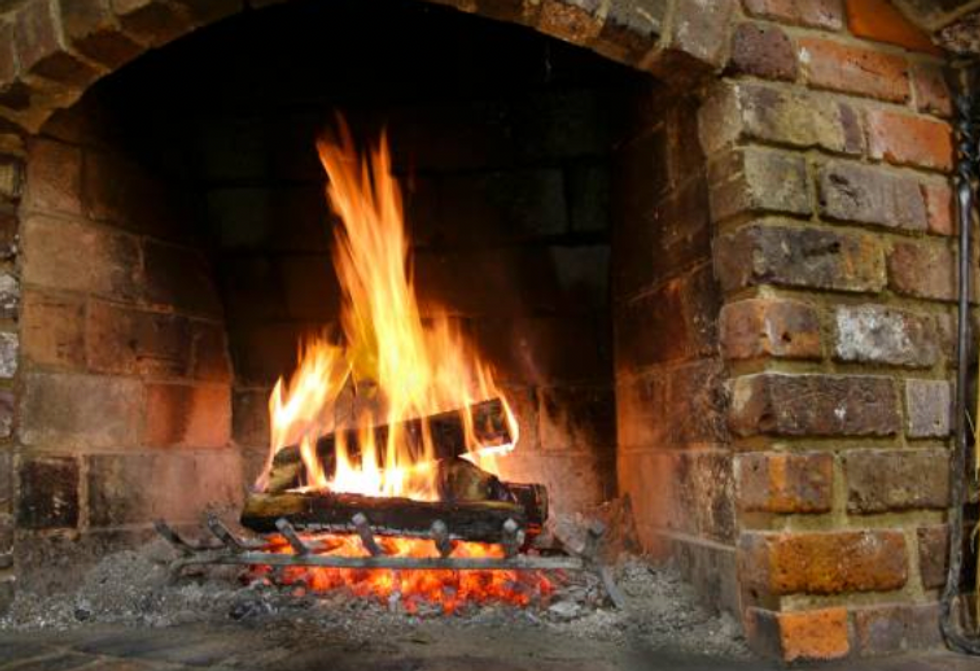
Around half of UK concentrations of PM comes from anthropogenic sources such as wood burning
|Getty Images
Take control of the wheel
This brings us on to what can be done to reduce the risk of cancer.
"We as physicians, parents and educators should encourage a healthy lifestyle (healthy diet, exercise, avoiding carcinogenic toxins, etc.) that can help to reduce early-onset cancer and ultimately lessen morbidity rates," said Doctor Nelly Awkar-Lazo.
Swanton of Cancer Research UK also emphasised the agency people of all ages have: “Around four in 10 cancer cases are preventable, and there are steps people can take to help reduce their cancer risk."
As the clinician points out, not smoking, keeping a healthy weight, being safe in the sun and cutting down on alcohol all make a "big difference".
No single food can prevent cancer but numerous studies suggest you can lower your risk by eating a healthy and balanced diet.
This is partly because of the diet itself, but mostly because it can help you keep a healthy weight or lose weight.
Many dietary components have been shown to boast anti-cancer properties.
In the largest study of its kind, funded by World Cancer Research Fund and published in The American Journal of Clinical Nutrition last year, increasing the intake of folate – which can be found in leafy greens, such as spinach, cabbage and broccoli – reduced reduce the risk of colorectal cancer by up to seven percent.
Research also suggests that eating more fibre may reduce the risk of certain cancers.
And we know for definite that processed meat is a cause of cancer.
The government recommends that people who eat a lot of processed and red meat should cut down to 70g or less per day. This is about three slices of ham, two slices of bacon or one small beef burger.
There is evidence that getting enough exercise when you're young can also significantly reduce a person's risk of cancer in later life.
One major study, published in the British Journal of Sports Medicine, in young men suggests that regular running, fast walking and other aerobic exercise can significantly reduce the risk of nine types of cancer when you get older.
Being physically active lowers cancer risk by helping you to keep a healthy weight.
According to the NHS, for most adults, a BMI of 18.5 to 24.9 puts you in the healthy weight range.
Making the best of a bad situation
Despite best efforts, a proportion of young people will develop cancer.
That's why early intervention remains critical.
"With greater awareness, improved screening methods, and updated screening recommendations, we should be able to catch cancers earlier than before," Karcher said.
He rightly points out that treating cancer at an early stage is also less costly than treating advanced-stage disease, as it often requires fewer medical interventions, hospitalisations, and supportive care services.
There are strides in this space.
Advancements in screening and diagnostics mean we're catching more cancers that might have gone undiagnosed in the past.
It’s also important to remember that many cancers cause no symptoms in the early stages, making screening that much more important for young adults.
Fortunately, screening for certain cancers is now happening earlier, thanks to changes in the recommended time to begin screening for these cancers.
Technological advances are also aiding early detection. Earlier this month a ground-breaking study found a way to fully diagnose medulloblastoma much faster.
Around 50 children in the UK are diagnosed with this type of brain tumour each year.
The new technique works with the MRI scans doctors already use to locate tumours. It takes minutes, not weeks.
Likewise, children and young adults with a form of leukaemia that develops rapidly are set to benefit after NICE in April recommended an innovative, life-extending treatment where the person’s own immune cells are modified to fight the cancer.
It is estimated that around 40 children and young adults in England would be eligible for this innovative treatment.
Around 300 people in England aged 25 and under are diagnosed each year with acute lymphoblastic leukaemia.
Meanwhile, the government has set up a task force to drive forward progress in tackling cancer in children and young people.
It will bring together clinicians, charities and patient groups to combat childhood cancer.
The Children and Young People Cancer Taskforce, to be chaired by Dame Caroline Dinenage MP, aims to improve how we detect, treat and care for children with cancer, and will discuss how to save lives and deliver world-leading cancer services.

A ground-breaking study found a way to fully diagnose medulloblastoma much faster.
|Getty Images
A new dawn
Treatment breakthroughs more broadly are also coming down the pike.
Thousands of cancer patients in England are set to gain fast-tracked access to trials of personalised cancer vaccines following the launch of a world-leading NHS trial ‘matchmaking’ service to help find new life-saving treatments.
The vaccines being tested as part of the trials aim to help patients with different types of cancer and, if successfully developed, researched and approved, cancer vaccines could become part of standard care.
The investigational cancer vaccines evaluated in the colorectal cancer trial are based on a molecule called mRNA, the same technology used for the COVID-19 vaccine.
They’re created by analysing a patient’s tumour to identify mutations specific to their own cancer. Using this information, medics can create an individualised cancer vaccine.
An immunotherapy drug recently rid patients of bowel cancer without the need for surgery and chemotherapy.
Jemperli (also called dostarlimab) from GSK showed “unprecedented results”, the firm said, with no evidence of disease in all patients treated
It comes after an immunotherapy drug given before surgery instead of chemotherapy resulted in significantly more patients with a certain genetic profile being cancer-free after surgery.
Though still predominantly a cancer that affects older people, cases among the under 50s have been increasing in recent decades.
These treatment interventions could therefore help turn the tide on an alarming trend.
Adam, who was diagnosed with non-Hodgkin lymphoma at just 14, says a "diagnosis at that age is a lot to take and I think it can come out in different ways, sometimes years later”.
Unfortunately, there's no straightforward explanation for the rise of cancer in young people.
But listening to stories like Adam's is a powerful reminder that we must stop at nothing until we find one.





